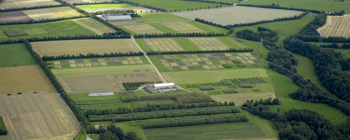14 projects selected for funding in FACCE SURPLUS
It has now been decided which projects should receive funding in the frame of the FACCE SURPLUS ERA-NET.

27 full proposals were submitted for the final evaluation by an international panel of reviewers, and among them 14 projects have now been chosen.
The projects fall within the three main themes presented in the call:
- Spatial targeting of land use to increase biomass production and transformation
- Developing markets
- Sustainable intensification of integrated food and non-food systems of agriculture
Some projects cover more than one theme.
The projects are planned to start in the beginning of 2016 and all projects must be completed by the end of April 2019. All project partners will be invited to participate in the common Kick-Off Meeting at the Aarhus University in Foulum, Denmark, from 13 to 15 September 2016.
The 14 selected projects are:
TSARA - Targets for Sustainable And Resilient Agriculture. This project investigates means to support and develop pathways to delivering to the UN Sustainable Development Goals (SDG) and targets.
MISCOMAR - Miscanthus biomass options for contaminated and marginal land: quality, quantity and soil interactions. The primary objective of this project is to develop techniques for biomass production on marginal land in Europe.
PREAR - Predicting and enhancing the Resilience of European Agro-ecosystems to environmental change using crop Rotations. The aim of PREAR is to devise validated, practical and stakeholder-acceptable rotational cropping systems that assure stable agro-ecosystem service provision and are resilient in the face of climate change.
Agronickel - Developing Ni agromining on ultramafic land in Europe. Serpentine (ultramafic) outcrops in Europe cover over 10,000 km2 of low fertility and low productivity, making them unattractive for traditional agriculture. AGRONICKEL aims to implement agroecosystems which can lead to better soil resource efficiency and to offer a fully integrated, new agromining agriculture.
SustainFARM - Innovative and sustainable intensification of integrated food and non-food systems to develop climate-resilient agro-ecosystems in Europe and beyond. The main objective of SustainFARM is to enhance agronomic, environmental and economic performance of integrated food and non-food production systems (IFNS) by optimizing productivity and valorizing woody components, residual wastes and co-products.
BioC4 - New integrative sustainable system from C4 photosyntetic miscanthus to biological synthesis of valuable C4 compounds. BioC4 will focus on developing technologies around‘bio-isobutanol’, a powerful compound platform from which multiple products with high market potential can be launched. The aim is to develop an industrial isobutanol production process.
VitiSmart - Toward a sustainable viticulture: Improved grapevine productivity and tolerance to abiotic and biotic stresses by combining resistant cultivars and beneficial microorganisms. The project aims to produce a resilient viticultural system able to speedily recover from biotic and abiotic stresses.
SUSTAg - Assessing options for the SUSTainable intensification of Agriculture for integrated production of food and non-food products at different scales. The overarching aim of SUSTAg is to identify both generic and location-specific SI (Sustainable Intensification) pathways and options at the global/European and case study level to build a competitive European bioeconomy.
VITAL - Viable InTensification of Agricultural production through sustainable Landscape transition.
The project explores transition processes of European agricultural systems towards sustainably intensified production. VITAL identifies how differences in agricultural systems lead to, or inhibit, alternate transition processes of SI.
BarPLUS - Modifying canopy architecture and photosynthesis to maximize barley biomass and yield for different end-uses. BarPLUS will identify genes, alleles and lines needed to increase barley plant biomass, without penalty on grain yield, in the agro-climatic and management scenarios predicted for 2030 in Southern and Central Europe.
SidaTim - Novel Pathways of Biomass Production: Assessing the Potential of Sida hermaphrodita and Valuable Timber Trees. SIDATIM will assess and model the economic and ecological potentials of growing Sida in combination with valuable timber trees as a means to foster an intensified but also a diversified agriculture on a local and a regional scale in different European countries.
Sweedhart - Separation of weeds during harvesting and hygienisation to enhance crop productivity in the long term. OrganisersThe project project aims at studying concepts to reduce the weed pollution of fields with a concurrent benefit via biomass utilization. The project outcome will provide a catalogue of successful, sustainable measures to hamper the weed pollution of fields to counteract the growing problems of herbicide resistant and invasive weeds.
OLIVE-MIRACLE - ModellIng solutions for improved and Resilient mAnagement strategies for Olive tree against future CLimatE change. The aim of this project is to provide accurate tools to test the effectiveness of adaptation/mitigation management strategies to support long-term investment decision making on olive-tree cultivation across the Mediterranean under current and future climate.
INTENSE - Intensify production, transform biomass to energy and novel goods and protect soils in Europe. INTENSE will contribute to reconverting poor, abandoned and polluted sites into sustainable agricultural production across Europe. Innovative systems-based tools for the development and implementation of integrated food and non-food production serving for intensified land management of these land areas will be constructed.
A substantial contribution to the building of a European bioeconomy
Nicolas Tinois from Project Management Jülich is the coordinator of FACCE SURPLUS. He is happy to see that so many qualified projects addressing a wide range of future challenges for European agriculture have been approved and looks forward to the work ahead:
- Thanks to the tremendous work performed by the peer-reviewers, these projects have been selected on the sole basis of their quality, in terms of scientific excellence, potential impact and quality of the implementation. We are convinced that they will make a substantial contribution to the building of a European bioeconomy, by improving the cooperation across the European Research Area in the area of biomass production and utilization along the entire value chain, Nicolas Tinois says and continues:
- Those projects will be supported during their lifetime by FACCE SURPLUS in particular in terms of communication and dissemination. This is an essential aspect of research in order to generate high impact in research communities while also supporting the effective dissemination of the project research results and a productive knowledge exchange with non-scientific end users In this regard we are looking forward to the upcoming common kick-off meeting of these research projects in June 2016 at the Aarhus University, where relevant stakeholders can be informed about the research which will be performed and potential outputs”.
Meanwhile, the FACCE SURPLUS partners are looking ahead and preparing further activities in the areas of diverse and integrated food and non-food biomass production and transformation systems, including biorefining, supporting innovation and value creation from biomass and biorefineries.
The international panel reviewing the submitted projects can be found here.
